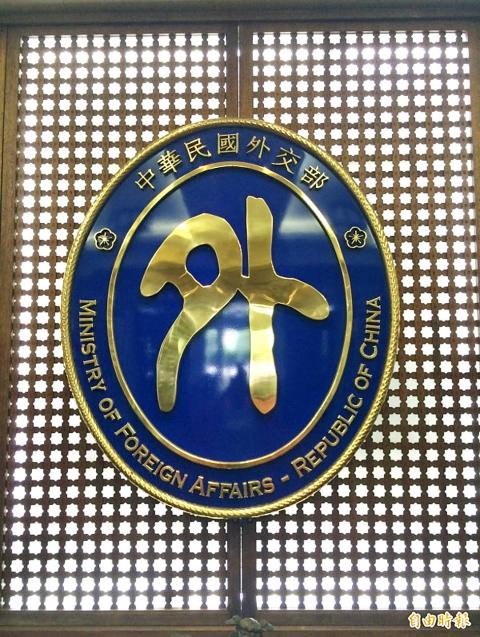The Ministry of Foreign Affairs yesterday expressed regret over the Philippines’ decision to deport seven Taiwanese fraud suspects to China, the second such move in less than a year.
“With regard to the Philippine government’s forced deportation of seven Taiwanese nationals suspected of telecom fraud today [Tuesday], we express deep concerns and regret over the matter,” deputy spokeswoman Joanne Ou (歐江安) told a routine news conference in Taipei.
The ministry had been negotiating with Manila since 13 Taiwanese were arrested in October last year in the northern Philippines in connection with fraud allegations, asking it to handle Taiwanese cases in accordance with the nationality principle and the suspects’ preferences, and to deport them to Taiwan for further investigation.

Photo: Lu Yi-hsuan, Taipei Times
Despite the best efforts of the Taipei Economic and Cultural Office in the Philippines, Manila chose to deport seven of the 13 to China in disregard of international customs and principles, as well as the suspects’ rights, Ou said.
The Philippines in April last year deported 78 Taiwanese telecom fraud suspects to China who had been among more than 150 foreigners arrested in January in Metro Manila and Ilocos Sur province by the Philippine cybercrime police.
While urging Taiwanese not to engage in illegal activities when abroad, Ou also called on Manila to strengthen bilateral anti-crime cooperation with Taipei to combat transnational crimes.
Under a memorandum of understanding on combating transnational crimes signed by the two countries in March 2017, the Philippines has extradited several Taiwanese fugitives, including former Tainan County council speaker Wu Chien-pao (吳健保) and Israeli-American Oren Shlomo Mayer.
The Manila Economic and Cultural Office in Taipei yesterday said that its government “deemed it necessary to send the suspects to Beijing for trial” as most of the victims and evidence were in China.
Manila would continue to adhere to the international community’s efforts to stop transborder crime by ensuring that perpetrators are effectively prosecuted and that punishment is meted out, it said.
The remaining six Taiwanese are in custody in Manila, where they are to face trial, because they have committed other crimes in Manila, it added.
Several nations have chosen to abide by Beijing’s “one China” principle and deported more than 400 Taiwanese fraud suspects to China since April 2016, including Kenya, Armenia, Malaysia, Indonesia, Cambodia and Vietnam.

NATIONAL SECURITY THREAT: An official said that Guan Guan’s comments had gone beyond the threshold of free speech, as she advocated for the destruction of the ROC China-born media influencer Guan Guan’s (關關) residency permit has been revoked for repeatedly posting pro-China content that threatens national security, the National Immigration Agency said yesterday. Guan Guan has said many controversial things in her videos posted to Douyin (抖音), including “the red flag will soon be painted all over Taiwan” and “Taiwan is an inseparable part of China,” while expressing hope for expedited “reunification.” The agency received multiple reports alleging that Guan Guan had advocated for armed reunification last year. After investigating, the agency last month issued a notice requiring her to appear and account for her actions. Guan Guan appeared as required,

A strong cold air mass is expected to arrive tonight, bringing a change in weather and a drop in temperature, the Central Weather Administration (CWA) said. The coldest time would be early on Thursday morning, with temperatures in some areas dipping as low as 8°C, it said. Daytime highs yesterday were 22°C to 24°C in northern and eastern Taiwan, and about 25°C to 28°C in the central and southern regions, it said. However, nighttime lows would dip to about 15°C to 16°C in central and northern Taiwan as well as the northeast, and 17°C to 19°C elsewhere, it said. Tropical Storm Nokaen, currently

PAPERS, PLEASE: The gang exploited the high value of the passports, selling them at inflated prices to Chinese buyers, who would treat them as ‘invisibility cloaks’ The Yilan District Court has handed four members of a syndicate prison terms ranging from one year and two months to two years and two months for their involvement in a scheme to purchase Taiwanese passports and resell them abroad at a massive markup. A Chinese human smuggling syndicate purchased Taiwanese passports through local criminal networks, exploiting the passports’ visa-free travel privileges to turn a profit of more than 20 times the original price, the court said. Such criminal organizations enable people to impersonate Taiwanese when entering and exiting Taiwan and other countries, undermining social order and the credibility of the nation’s

‘SALAMI-SLICING’: Beijing’s ‘gray zone’ tactics around the Pratas Islands have been slowly intensifying, with the PLA testing Taiwan’s responses and limits, an expert said The Ministry of National Defense yesterday condemned an intrusion by a Chinese drone into the airspace of the Pratas Islands (Dongsha Islands, 東沙群島) as a serious disruption of regional peace. The ministry said it detected the Chinese surveillance and reconnaissance drone entering the southwestern parts of Taiwan’s air defense identification zone early yesterday, and it approached the Pratas Islands at 5:41am. The ministry said it immediately notified the garrison stationed in the area to enhance aerial surveillance and alert levels, and the drone was detected in the islands’ territorial airspace at 5:44am, maintaining an altitude outside the effective range of air-defense weaponry. Following